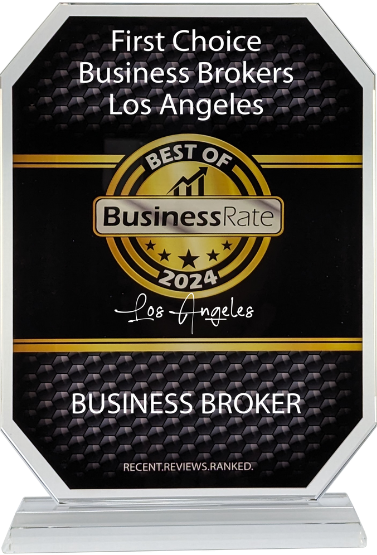How to Sell Your Small Business: A Comprehensive Guide
Selling a small business can be a big step for any owner. It requires careful planning and a clear understanding of the process. Whether you're ready to retire, looking for a new challenge, or simply wanting to cash in on your hard work, knowing how to sell your business correctly is crucial. This guide will help you navigate the steps, from preparing your business for sale to managing the proceeds afterward.
Preparing Your Business for Sale
Organizing Financial Records
When preparing to sell your business in Los Angeles, having your financial records in order is crucial. Buyers will want clean and accurate financial statements, tax returns, and profit and loss statements. Make sure all your financial documents are organized and easily accessible. Consulting with a financial advisor or accountant can help you identify any areas that need improvement before listing your business.
Improving Operational Efficiency
Enhancing your business's operational efficiency can make it more attractive to potential buyers. This includes updating your operating manual, ensuring all equipment is in good working order, and streamlining processes. A well-run business is more appealing and can command a higher price.
Addressing Legal Issues
Before listing your business, address any legal issues hindering the sale. This includes resolving ongoing lawsuits, ensuring compliance with local and federal regulations, and protecting intellectual property. Hiring a legal advisor can help you navigate these complexities and ensure a smooth sale process.
Planning and experience are key to a successful outcome. Appoint the right team and take advantage of the various tax reliefs.
For those looking to sell my business in Los Angeles, companies like First Choice Business Brokers Los Angeles can provide valuable assistance in navigating the complexities of the sale process.
Valuing Your Business Accurately
Hiring a Professional Valuator
Consider hiring a professional valuator to get the most accurate value for your business. A professional valuator can explain your business's worth, which can help set a credible asking price. Companies like First Choice Business Brokers Los Angeles offer business valuation services in Los Angeles, ensuring you get a fair and accurate valuation.
Understanding Market Trends
Understanding market trends is crucial in valuing your business. Market trends can significantly impact your business's value. By watching industry trends, you can better understand what potential buyers might be willing to pay. This knowledge can help you set a realistic price and make your business more attractive to buyers.
Evaluating Business Assets
Evaluating your business assets is another essential step in the valuation process. This includes looking at both tangible and intangible assets. Tangible assets might include equipment, inventory, and property, while intangible assets could be your brand reputation and customer relationships. By thoroughly evaluating these assets, you can get a clearer picture of your business's overall value.
Understanding your business's value can help you make informed decisions and increase its worth over time.
Marketing Your Business to Potential Buyers
Creating a Marketing Plan
A well-thought-out marketing plan is essential for attracting potential buyers. Start by identifying your target audience and understanding what makes your business appealing to them. Highlight your business's strengths, such as increasing profits, a strong customer base, or unique products and services. A comprehensive marketing plan should include online and offline strategies to reach a wider audience.
Utilizing Online Platforms
In today's digital age, online platforms are crucial for marketing your business. Websites like BizBuySell allow you to list your business anonymously, making it easier to reach a broad audience. Social media marketing can help you engage with potential customers, build brand awareness, and promote your products. Additionally, consider using email marketing and online business forums to spread the word about your sale.
Networking with Industry Contacts
Networking is a powerful tool for finding potential buyers. Contact your industry contacts, including competitors, suppliers, and customers, who might have a strategic interest in your business. Attend industry events, trade shows, and conferences to meet potential buyers face-to-face. Companies like First Choice Business Brokers Los Angeles can also assist in connecting you with serious buyers and guiding you through the selling process.
Marketing your business effectively can significantly increase your chances of finding the right buyer and securing a successful sale.
Negotiating the Sale
Setting Your Asking Price
Knowing the buying process is crucial when setting your asking price. Research similar businesses in your industry to understand market rates. This will help you set a competitive price that attracts serious buyers.
Handling Buyer Inquiries
Responding to buyer inquiries promptly and professionally is key. Ensure all necessary documents are ready, such as financial records and operational manuals. This will make the process smoother and build trust with potential buyers.
Finalizing the Terms
Finalizing the terms of the sale involves negotiating payment terms, warranties, and any contingencies. Working with a professional like First Choice Business Brokers Los Angeles is advisable to ensure all aspects are covered. This will help you avoid any last-minute surprises and ensure a smooth transaction.
Negotiating the sale of your business can be complex, but with the right preparation and professional help, you can achieve a successful outcome.
Legal Considerations in Selling Your Business
When selling your small business, addressing several legal aspects will ensure a smooth and successful transaction. Here are the key areas to focus on:
Drafting the Sales Agreement
A well-drafted sales agreement is essential for a successful sale. This document outlines the terms and conditions of the sale, including the purchase price, payment terms, and any contingencies. Hiring a good contract lawyer can help you draft and review this agreement to ensure it meets your goals and protects your interests.
Ensuring Compliance with Regulations
Compliance with local, state, and federal regulations is vital when selling your business. This includes obtaining any necessary permits and licenses and ensuring that your business operations adhere to all applicable laws. Working with a knowledgeable attorney can help you navigate these requirements and avoid potential legal pitfalls.
Protecting Intellectual Property
Your business's intellectual property (IP) is a valuable asset that needs protection during the sale process. This includes trademarks, copyrights, patents, and trade secrets. Make sure to clearly outline the transfer of IP rights in the sales agreement and take steps to safeguard your proprietary information.
Selling a small business is a complex venture that involves several considerations. It can require that you enlist a broker, accountant, and/or an attorney to ensure all legal aspects are covered.
Addressing these legal considerations can help ensure a smooth and successful sale of your business. First Choice Business Brokers Los Angeles can provide valuable assistance in navigating these legal complexities.
Transitioning Ownership Smoothly
Transitioning ownership is a critical phase when selling your small business. A well-thought-out plan can make this process seamless and less stressful. Here are some key steps to ensure a smooth transition:
Developing a Transition Plan
Creating a detailed transition plan is essential. This plan should outline how the new owner will take over the business operations. Consider including timelines, key responsibilities, and any necessary training. A comprehensive plan demonstrates your commitment to a smooth hand-off and can make your business more attractive to potential buyers.
Communicating with Employees
Clear communication with your employees is crucial during the transition period. Inform them about the sale and how it will affect their roles. Address any concerns they might have and keep them updated throughout the process. This transparency helps maintain morale and ensures your team remains productive and supportive during the changeover.
Training the New Owner
Providing thorough training to the new owner is vital for a successful transition. Share your knowledge about the business operations, customer relationships, and other critical information. Consider creating manuals or standard operating procedures (SOPs) to help the new owner get up to speed quickly. This preparation can significantly reduce the risk of disruptions and ensure continuity.
The transition period to new ownership is a vulnerable time for a business. Prepare both your successor and your business for a smooth hand-off.
For expert assistance in transitioning ownership, consider contacting First Choice Business Brokers Los Angeles. They can provide valuable guidance and support throughout the process.
Managing the Proceeds from the Sale
Tax Implications of Selling
After selling your business, it's crucial to understand the tax implications. Consulting with a tax professional can help you minimize your taxes on the sale. They can guide you on structuring the transaction beneficially and seeking capital gains treatment. Additionally, consider taking a loss on other investments to offset gains.
Investing the Proceeds
Once you have the proceeds from the sale, it's important to invest wisely. Create a plan outlining your financial goals, focusing on long-term benefits like getting out of debt and saving for retirement. Speaking with a financial advisor can help you determine the best investment strategies to meet your short- and long-term goals.
Planning for Retirement
If retirement is on the horizon, it is time to plan for it. Ensure that your investments align with your retirement goals. Consider consulting with a retirement planner to create a comprehensive plan that includes income sources, expenses, and lifestyle choices. This will help you enjoy a comfortable and secure retirement.
Taking the time to plan and manage the proceeds from the sale of your business can set you up for long-term financial success. First Choice Business Brokers Los Angeles can provide valuable guidance throughout this process.
Conclusion
Selling your small business is a big step, but it can be a smooth and rewarding process with the right preparation and guidance. Start by understanding why you want to sell and plan your exit strategy early. Get your financial records in order, and don't hesitate to seek help from professionals like business brokers, valuators, and commercial bankers. By taking these steps, you can ensure that you sell your business at the right time, for the right price, and to the right buyer. Good luck on your next adventure!
Frequently Asked Questions
What should I do first when selling my small business?
The first step is to organize your financial records. Make sure everything is up-to-date and accurate. This will help you present your business in the best light to potential buyers.
How do I determine the value of my business?
You can hire a professional valuator to get an accurate estimate. They will consider your financial records, market trends, and business assets.
What are the best ways to market my business for sale?
To reach potential buyers, you can create a marketing plan, use online platforms, and network with industry contacts.
How should I handle negotiations with buyers?
Set a clear asking price, be prepared to answer buyer questions, and work on finalizing the terms of the sale carefully.
What legal issues should I be aware of when selling my business?
Draft a sales agreement, comply with all regulations, and protect your intellectual property.
How can I make the ownership transition smooth for the new owner?n pitfalls should I avoid in business valuation?
Develop a transition plan, communicate openly with employees, and provide training for the new owner.
This blog is intended for informational purposes only and does not constitute financial, legal, or professional advice. Readers are encouraged to consult qualified professionals to address their specific circumstances, including business valuation, legal compliance, tax implications, and investment strategies. While efforts have been made to ensure the accuracy of the information provided, the author and publisher assume no responsibility for errors, omissions, or outcomes based on the use of this content. Additionally, any mention of third-party services does not constitute an endorsement or guarantee of their effectiveness or reliability.






